Recent News
Turtle Hill Golf Club & BAMZ Turtle ProjectWednesday, September 04, 2013
The Fairmont Southampton’s Championship Par 3 golf course, The Turtle Hill Golf Club, is living up to its name. The golf club was rebranded to the current name in October 2012 to portray an authentically local name, and to bring awareness to the sea turtle preservation efforts in Bermuda.
Back to school strategising
Tuesday, September 03, 2013
I love the smell of newly sharpened pencils. Never mind the thrill of buying a new pencil case! I have a bit of a ‘thing’ for stationery but particularly when it’s mixed with the buzz of anticipation that comes with the start of a new year at school.
More Reef Watch teams needed
Wednesday, August 28, 2013
The Bermuda Zoological Society is looking for at least six more volunteer teams to participate in Reef Watch on August 31.
Want to help with reef research? You can still sign up
Wednesday, August 28, 2013
There is still time for volunteers to sign up to this Saturday’s Reef Watch event which will use teams of volunteer citizen scientists to monitor the health of Bermuda’s economically important reef systems.
Countdown To BZS’s “Reef Watch” Event
Monday, August 26, 2013
Excitement is mounting as teams have been registering for the upcoming Reef Watch which will be held on Saturday, August 31.
About
GovernanceAbout Us
Newsletter
Latest News
Gift & Bookstore
Contact
General Inquiries
info@bzs.bm
Latest News
All the latest updates and news from the Bermuda Aquarium, Museum, and Zoo, one of Bermuda's leading visitor attractions!
Owain Johnston-Barnes
Published Oct 25, 2017 at 8:00 am (Updated Oct 25, 2017 at 7:38 am)
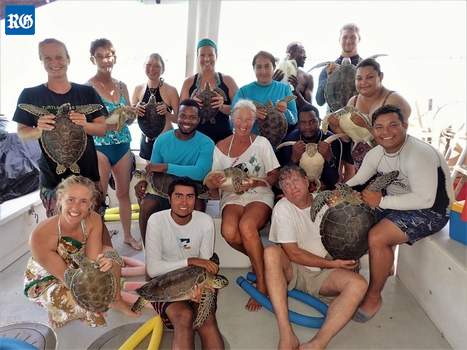
Shelling out: the Bermuda Turtle Project 2017’s
international course participants
Almost 200 turtles were plucked from the island’s waters this August as the Bermuda Turtle Project continued its conservation work.
While fewer turtles were found at offshore sites, the number of small turtles found closer to shore have risen.
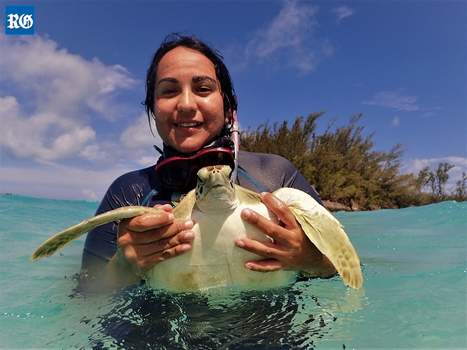
A fine specimen: Sandra Gallegos, from Mexico,
captures a healthy green turtle
A spokesperson for BTP said: “Following hatching on the nesting beach, sea turtles spend a few years out in the open ocean before moving into coastal habitats such as Bermuda.
“The increase in small turtles is not unexpected given the increase in the major nesting populations known to contribute to the green turtle aggregation in Bermuda. The organisation added that nesting populations in Costa Rica, Florida and Mexico have all grown thanks to conservation efforts.
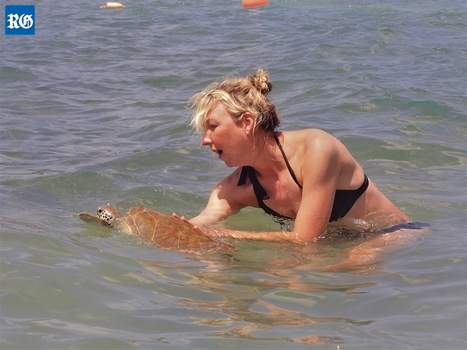
Gently does it: Abigail Alldis, a Bermuda participant,
gently releases a green turtle
BTP was first launched in 1968 to learn more about Bermuda’s turtles.
This year, volunteers and organisers visited 14 sites over a two-week period in August, catching and releasing 194 green turtles.
While fewer turtles and seagrass were found in areas like Fort St Catherine and Grotto Bay, other areas including Bailey’s Bay and Somerset Long Bay continued to be rich with turtles.
The spokesperson added: “Among the capture were 68 turtles that had been previously tagged, most in the same site as their original capture. One had a 12-year BTP history.”
The organisation said that the number of turtles in Bermuda has not changed significantly in recent years, their distribution has.
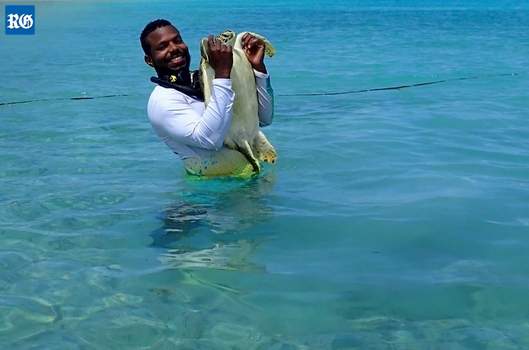
Gotcha! Damany Calder, from Jamaica,
captures a green turtle in the shallows
The spokesperson said: “With most boating activity and observations by the community taking place near shore, it makes sense that we perceive there are more turtles, but so far it just looks like they are all moving closer to shore.”
The team also performed 17 necropsies, examining dead turtles to find out what killed them.
While the results were “not out of the ordinary”, more turtles appeared to have been hit by boats than in previous years.
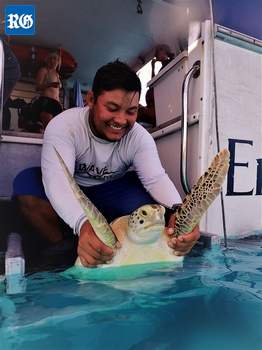
“This could well be because there were more boats out on the water in 2017 and our sea turtle hotline was promoted island- wide,” the organisation said.
“Six of the animal necropsies had propeller or blunt trauma scars indicative of boat strikes.
“Two died because of entanglement in monofilament fishing line and for the remainder we were not able to conclusively identify the cause of death. Unless the animals are fresh dead when they are examined, it is challenging to determine the cause of death.”
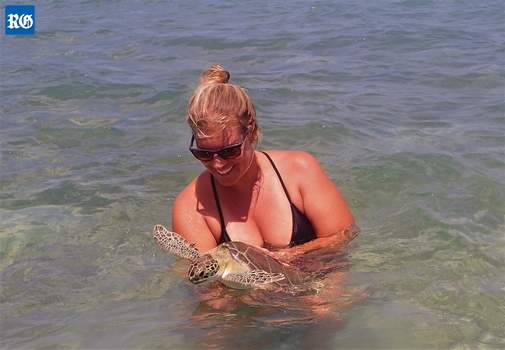
This year, the BTP was assisted by environmental officers and biologists from Jamaica, Mexico, Guatemala, Anguilla, Costa Rica and the Turks and Caicos, along with two candidates from Bermuda.
Through the course, they were able to practise a number of research methods, discuss scientific papers, attend lectures and deploy a satellite transmitter.


